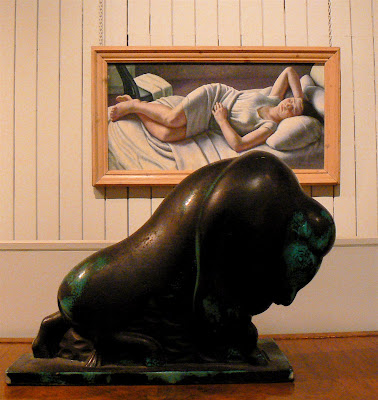A basalt statue known as Hoa Hakananai'a (probably 'stolen' or 'hidden friend') from Easter Island/Rapa Nui, Chile (South Pacific), dating from about 1400; and Mask II a mixed media self-portrait by Ron Mueck created in 2000-2001...

As the Brit Mus website says (with only a modicum of arty-fartiness):
These two figures speak to each other across several centuries and 8,500 miles in the long history of monumental sculpture. Both reveal the enduring human need to make our own image on a grand scale.You can see more of Ron Mueck's disturbingly hyper-realistic figures here.
Mask II’s prostrate orientation also alludes to the many fallen moai (statues of human figures) that remain on Rapa Nui today as reminders of a civilisation that has since been transformed.
And here's another curious alignment of images - this time from Brighton Museum: a glazed and enameled earthenware Bison, made for the Au Printemps store in Paris, c 1925, and Early Morning, an oil painting dating from 1927 by Dod Proctor...

If anyone feel inspired to write a BM style analysis of this particular juxtaposition, please feel free...
All entries will be published!
8 comments:
The connection between these pieces couldn't be more obvious.The emergence of two species from the ethereal world of the sub-conscious is starkly defined with the loveliness of gradual and delicate transition highlighted throughout the women's prostrate form.In front, by contrast, the cold and stone-hearted beast lumbers to its feet with barely an acknowledgement of the dormant state he has just left.
Waysifib : In a full-colour, glossy museum guide, a piece of text created purely to justify the presence, in an exhibition, of a piece displaced from its usual home by a cleaner's vaccuum, mop and bucket.
(Not to be confused with Waysifib-emin where the text actually justifies the presence of the mop and bucket in the exhibition itself)
Your commentary on the exhibits in the Brighton Museum have been passed by Brian Sewell as sufficiently pseudy for public consumption.
Of course, the trouble with using 'Waysifibs' is knowing whether the information they contain is true or not!
synitic :an expression used to describe a paragraph that justifies its own existence on purely aesthetic grounds, irrespective of content or accuracy eg 'Enraged, the Colonel picked up his pen and fired off another synitic deluge to the editor of the Times.' (The Lives and Loves of a Lady Officer in Boots, Methuen)
In this room of the Brighton Museum we can find a very attractive composition: the Bison of 1925 made for the shop Au Printemps stays in front of the modernist picture of Procter, Early Morning. We can remember, inevitably, the myth of the birth of Minotaur. Would be Procter thinking about Pasifae?.
These two figures speak to each other across two years and 1.4 metres miles in the short history of late 1920s art. One reveals the enduring human need to make images of pretty ladies, and the other challenges our oxen expectations on a small scale.
The semi-prostrate orientation of the foreground figurine alludes presciently to the many fallen cows (native British ungulates) that would succumb to both BSE and foot'n'mouth some eighty years subsequent to the creation of the sculpture itself.
Finally, the male bovine figure serves as a bronze encapsulation of the language typically used by art critics and art gallery caption writers.
Excellent catalogue notes, Eudora and Phil - I will forward them to the curator at Brighton Museum forthwith!!
You know Ron Mueck is an Australian?
Before he made big fancy sculptures he was a puppeteer.
You'd know his work in the film Labyrinth - he was Ludo.
Australians my age will know his characters from Shirl's Neighbourhood.
http://sandwichbag.blogspot.com/2007/12/childhood-flashback.html
Yes, Elliot, I knew Ron Mueck was a former puppeteer, though I wasn't aware that he hailed from Oz. Thanks for the link to info about Shirl's Neighbourhood, although - sadly - the YouTube video on that page is no longer available... :-(
Post a Comment